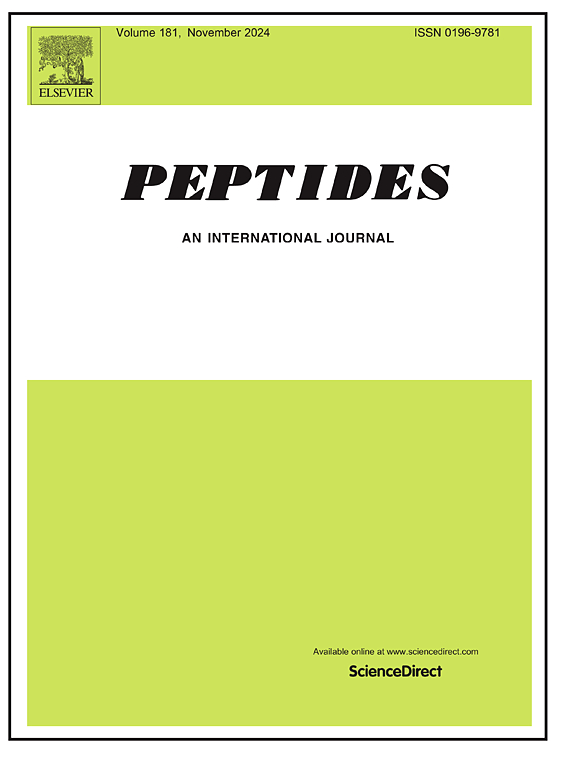Cholecystokinin regulates atrial natriuretic peptide secretion through activation of NOX4–Sirt1–LEF1 signaling in beating rat hypoxic atria
IF 2.9
4区 医学
Q3 BIOCHEMISTRY & MOLECULAR BIOLOGY
引用次数: 0
Abstract
The mammalian cardiac myocytes not only synthesize and secrete atrial natriuretic peptide (ANP), but also express cholecystokinin (CCK) and its receptors (CCK1R and CCK2R). However, atrial CCK expression patterns and its effects on ANP secretion during hypoxia are unclear. Therefore, this study is aimed to investigate the effect of hypoxia on the expression levels of CCK and its receptors, as well as the underlying mechanisms involved in regulating hypoxia-induced ANP secretion in isolated beating atria. The results of this study showed that acute hypoxia significantly upregulated expression of CCK and CCK1R as well as CCK2R through activation of hypoxia-inducible factor 1α–apelin signaling. Endogenous CCK induced by hypoxia markedly upregulated the expression of silent information regulator factor 2-related enzyme 1 (Sirt1) and its downstream nuclear factor erythroid‑2‑related factor 2 (Nrf2) via the activation of nicotinamide adenine dinucleotide phosphate oxidase 4 (NOX4), leading to increase of activating T cell factor (TCF) 3 and TCF4/ lymphoid enhancer factor (LEF) 1, ultimately promoting hypoxia-induced ANP secretion. In addition, siRNA-mediated knockdown of LEF1 dramatically attenuated hypoxia-induced increase of ANP expression in HL-1 atrial myocytes. These results indicated endogenous CCK induced by hypoxia promoted hypoxia-induced ANP secretion by activation of NOX4–Sirt1–TCF3/4–LEF1 signaling pathway.
胆囊收缩素通过激活搏动大鼠缺氧心房中的 NOX4-Sirt1-LEF1 信号来调节心房利钠肽的分泌
哺乳动物心肌细胞不仅能合成和分泌心房利钠肽(ANP),还能表达胆囊收缩素(CCK)及其受体(CCK1R 和 CCK2R)。然而,缺氧时心房 CCK 的表达模式及其对 ANP 分泌的影响尚不清楚。因此,本研究旨在探讨缺氧对离体搏动心房中 CCK 及其受体表达水平的影响,以及调节缺氧诱导 ANP 分泌的内在机制。研究结果表明,急性缺氧通过激活缺氧诱导因子1α-apelin信号传导,显著上调CCK和CCK1R以及CCK2R的表达。缺氧诱导的内源性CCK通过激活烟酰胺腺嘌呤二核苷酸磷酸氧化酶4(NOX4)显著上调沉默信息调节因子2相关酶1(Sirt1)及其下游核因子红细胞-2相关因子2(Nrf2)的表达,导致活化T细胞因子(TCF)3和TCF4/淋巴增强因子(LEF)1的增加,最终促进缺氧诱导的ANP分泌。此外,siRNA 介导的 LEF1 敲除可显著减少缺氧诱导的 HL-1 心房肌细胞 ANP 表达的增加。这些结果表明,缺氧诱导的内源性CCK通过激活NOX4-Sirt1-TCF3/4-LEF1信号通路促进缺氧诱导的ANP分泌。
本文章由计算机程序翻译,如有差异,请以英文原文为准。
求助全文
约1分钟内获得全文
求助全文
来源期刊

Peptides
医学-生化与分子生物学
CiteScore
6.40
自引率
6.70%
发文量
130
审稿时长
28 days
期刊介绍:
Peptides is an international journal presenting original contributions on the biochemistry, physiology and pharmacology of biological active peptides, as well as their functions that relate to gastroenterology, endocrinology, and behavioral effects.
Peptides emphasizes all aspects of high profile peptide research in mammals and non-mammalian vertebrates. Special consideration can be given to plants and invertebrates. Submission of articles with clinical relevance is particularly encouraged.
 求助内容:
求助内容: 应助结果提醒方式:
应助结果提醒方式:


